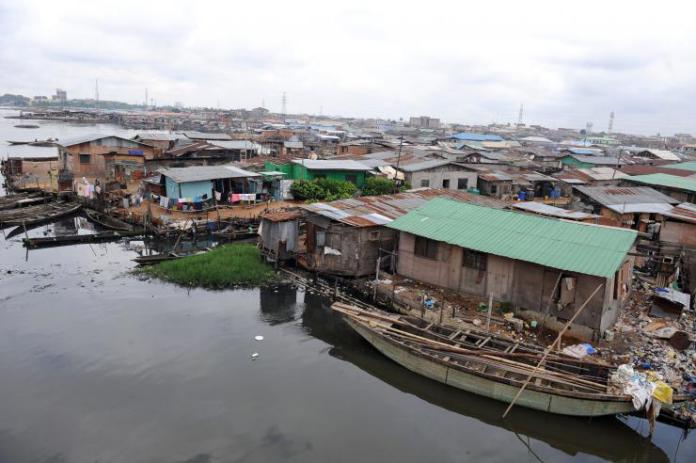Makoko has been described as an important fishing community located in Yaba Local Government Area of Lagos State, overlooking the Third Mainland Bridge.

The community faces imminent displacement threats from the government of Lagos State, without due consultations or plans for resettlement. The threat is triggered by on-going dredging of the lagoon and waterfronts in the community.
This appears to have destabilised the natural equilibrium of the lagoon ecosystems, and is impacting the people’s livelihoods and raising the spectre of flooding which could ultimately lead to permanent displacement of the inhabitants of Makoko.
The Makoko people who are predominantly fishers have lived peacefully for more than a century, using the proceeds from fishing to cater for their families and provide shelters, some on stilts and others on land.
Health of Mother Earth Foundation (HOMEF), a civil having organisation, says it listened to distress calls by some Makoko community members, and embarked on a field study in Makoko for assessment of the issues. HOMEF examined the motivation for the dredging exercise, checked the level of consultation with the people and the presence of a proper environmental impacts assessment (EIA).
The EIA should ideally consider the risks of erosion, salt water intrusion, loss of livelihoods and impacts on fisheries, transportation, health, culture, shelter and conflict/insecurity.
Interviews conducted revealed that most of the community persons were not aware of the reasons for the dredging. It was gathered that the Lagos State Government had awarded FBT Coral Estate Ltd the contract of dredging and “reclaiming” the waterfront of the community. While some community people knew of the on-going dredging, the people predominantly agreed that they were not part of and have not seen the EIA for the activities.
Community members fear that the dredging and land reclamation will have serious consequences arising from the blockage of canals and subsequent flooding that may affect other adjacent communities. The activities may also pose direct threats to food supply in the megacity.
Director of HOMEF, Nnimmo Bassey, called on the Lagos State Government and the contractors to stop the dredging of Makoko waterfront and listen to the teeming population of the residents.
He said: “There is need for government to have open conversations with the people who have deep knowledge of the environment and have made massive economic contributions to the state. The idea of using development as a foil for grabbing waterfronts, displacing and destroying the lives and cultures of the people must be halted.
“Makoko and other underserved communities in Lagos and elsewhere in Nigeria deserve to be upgraded with adequate supply of social services and not displaced for the benefit of land speculators and other forces of accumulation by dispossession.”
In recent years, demolition threats have hung heavily over the ommunity. The people fear that what happened in Maroko in 1990, which had 300,000 persons displaced and many lives lost, may be visited on them.
It will be recalled that, in 2012, the government of Lagos State demolished parts of Makoko community after purportedly giving them only 72 hours’ notice. Less serviced communities in Lagos have faced a similar fate with human rights abuses and deaths trailing such assaults.
Otodo Gbame suffered same fate on April 9, 2017, when the community woke up to see that it was surrounded by heavily armed policemen as their homes were destroyed and burnt. A more recent demolition happened in Monkey Village also in Lagos.
HOMEF believes that flood prone cities such as Lagos should cease the acts of so-called land reclamation as such activities worsen the crisis and reduce the city’s climate change resilience.
“Wetlands must remain wetlands and people who have kept such ecosystem balances should be supported and not criminalised or victimised,” added the group.
